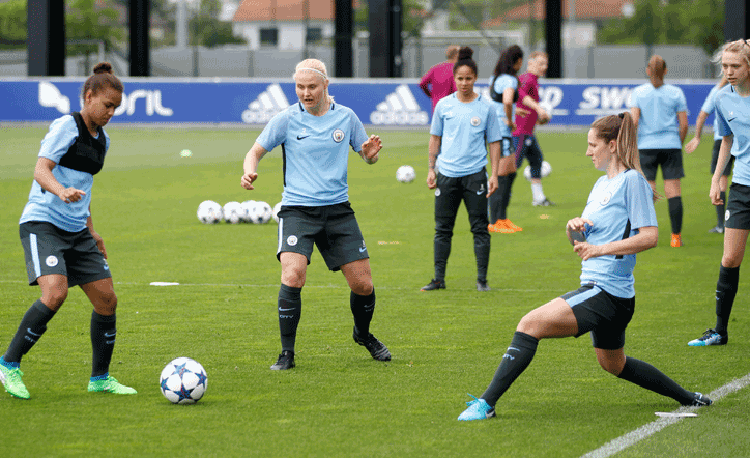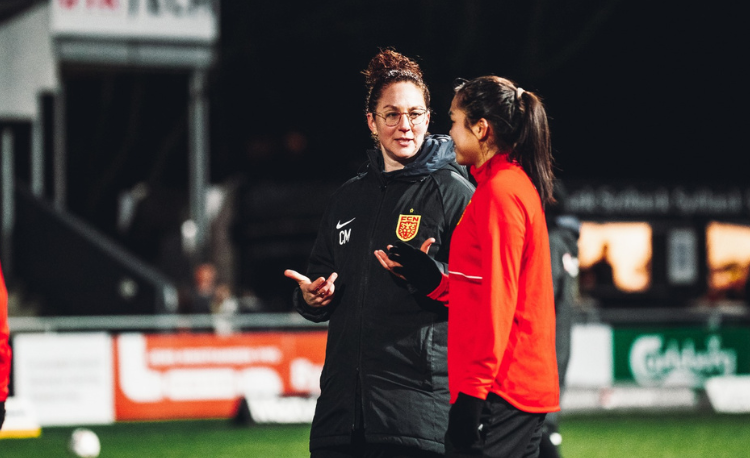You are viewing
1 of your 3 free articles
Using positive self-talk to improve performance
You are your own toughest opponent – but repeating feel-good mantras about yourself or your abilities can boost performance.
Picture this: Jenny and Maddy play on a team together.
Jenny is a United Soccer Coaches’ All-America award-winner, high school scholar national player of the year recipient and considered one of the top players in her state - opponents have referred to her as a ’soccer ninja’ and ’soccer Jedi’. In her most recent season, she scored 18 goals and had 16 assists in 15 games.
Maddy is one of the top defenders in the state and has anchored a team that only allowed three goals in 15 games. Her team-mates call her the ’brick wall’ because of her ability to anticipate plays and defend 1v1.
In the first overtime period of one of the sea most intense games of the season, Jenny receives the ball at the top of the penalty area, splits two defenders and dribbles at the goalkeeper.
She fakes a shot and sends the keeper diving right. Jenny calmly takes a step to the left, gets the ball under control and gets ready to send her team to an amazing win.
Then, she completely shanks the shot.
Maddy, who was running down the field for what she surely believed would be a celebration, gets in Jenny’s face and screams: “I can’t believe you did that! How can you miss that shot? You just cost us the game! Seriously, how is missing that shot even possible? You could have dribbled it into the net."
"We rarely address the berating that occurs internally when mistakes happen..."
How many of us would tolerate that type of behavior from Maddy? We know berating a team-mate is wrong, even worse in the heat of the moment and in full view.
What we don’t know or rarely address is the type of berating that occurs internally when mistakes happen.
I can guarantee you that what players do to themselves is significantly worse than the fictional situation described above.
By the way, although their names have been changed, those players are real. They were actually sisters that played for me.
There has been a lot of discussion regarding climate and culture across all levels of soccer, and for good reason.
From grassroots to the professional game, our sport has started to deal with coaching behaviors that lead to toxic team atmospheres.
However, one rarely developed area which can have significant impact on team climate and culture is positive self-talk.
In 2011, an analysis of 32 studies showed the effectiveness of self-talk in sport and encouraged its use as a strategy to facilitate learning and enhance performance.
The theory is clear - positive self-talk can improve performance. How do we put that into practice when we only see our players for 90 minutes at a time?

In order to train our players to use positive self-talk as a strategy, we have to give them the necessary tools to use even when they are NOT with us. I have given some suggested steps for self-talk in the panel on the right.
One of my favorite mantras to repeat is: “If you are not making mistakes, you are not trying hard enough."
It is a simple way to create an environment where players take risks. Interestingly, it is also a research-based method of getting players out of their comfort zone.
We know that players, regardless of playing level, become comfortable with skills and behaviors which have led to success.
If we are truly interested in developing players and pushing them beyond initial success, we have to get them acclimated to an environment in which errors of effort are recognized and applauded.
We also have to recognize that the players are their own harshest critics long before they hear from a coach or their team-mates.
In the movie Creed, Rocky Balboa tells Adonis Creed to get into his stance and look into the mirror. He says: “You see this guy staring back at you? That’s your toughest opponent."
That is true in boxing, in soccer and in life. The easiest way to beat that opponent is forming an internal structure for positive self-talk.
Haroot’s guide to positive self-talk
Related Files
Positive Self-Talk Step 1
> In pre-season, ask players to search the internet for three compelling motivational quotes.
> Once they have selected three quotes, have them get together with a teammate and share the quotes.
> Each team-mate then selects the best quote for their partner.
> Each partner is responsible for creating and decorating a 3x5 index card with the quote written on it.
> Once the card is completed, it is given back to the partner and they are then required to place it in a visible location in their home - a place she will see it every morning.
Positive Self-Talk Step 2
> Once the motivational quote for daily viewing has been selected, each player will use it as a mantra to repeat immediately after they make a mistake.
> Whenever a player makes a mistake in a training session, ask them to recite their quote out loud. It must become a habit. It is also important for the coach to model this behavior.
> When coaching, try to remember some of the quotes and repeat them when any player makes a mistake.
> Before matches, remind players about their mantra.
Newsletter Sign Up
Newsletter Sign Up
Discover the simple way to become a more effective, more successful soccer coach
In a recent survey 89% of subscribers said Women's Soccer Coaching makes them more confident, 91% said Women's Soccer Coaching makes them a more effective coach and 93% said Women's Soccer Coaching makes them more inspired.
*includes 3 coaching manuals
Get Inspired
All the latest techniques and approaches
Women's Soccer Coaching offers proven and easy to use soccer drills, coaching sessions, practice plans, small-sided games, warm-ups, training tips and advice.
We've been at the cutting edge of soccer coaching since we launched Soccer Coach Weekly in 2007, creating resources for the grassroots youth coach, following best practice from around the world and insights from the professional game.








